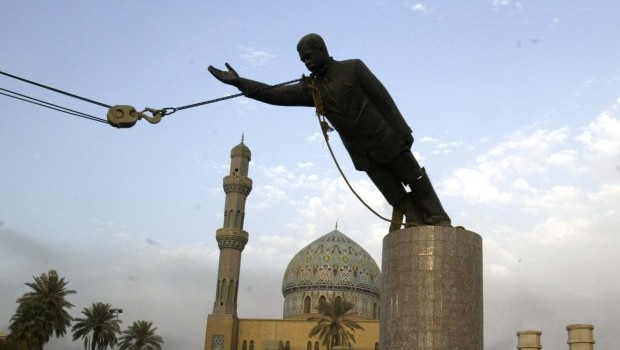
A U.S. Marine watches a statue of Saddam Hussein being toppled in Firdaus Square in downtown Baghdad on April 9, 2003 file photo. (AP Photo/Jerome Delay, File)
Baghdad, Asharq Al-Awsat—Hamid Majid Mousa, secretary-general of the Iraqi Communist Party and former member of the Iraqi Interim Governing Council, believes, “The changes that have come to Iraq ten years after regime change are not worth the sacrifices that the Iraqi people have made over the past decade in their drawn-out struggle against tyranny.”
In an interview with Asharq Al-Awsat Mr. Mousa said, “Unfortunately disillusionment was the only thing gained, and I’m not alone in saying so. Every reasonable person was truly anticipating the fall of tyranny and that it would be replaced by justice, equality, and general welfare in all areas of social and economic life. Yet only a fraction of what the Iraqi people struggled to achieve over the past decades has come to fruition.”
Mousa’s Iraqi Communist Party composed part of the main opposition to Saddam Hussein’s regime. His party, like others, was forced to cooperate with the US in order to bring about regime change despite holding diverging viewpoints. He added that, “As we mentioned, what was achieved is paltry compared to the sacrifices made and the hopes we, as the opposition, had of eradicating the burdensome legacy of tyranny. We were also disappointed that the change happened by way of invasion and occupation, which brought about other factors such as relentless terrorism and subversion, in addition to financial and administrative corruption so rampant it’s shameful.”
Mousa and his party participated in the 2005 elections and won two seats in parliament, but failed to win any in the 2010 parliamentary elections due to changes in election law. His party is now preparing to participate in the provincial elections and is undertaking a bare-bones media campaign compared to those of the ruling parties. As for other disappointing outcomes that have emerged over the past decade, he went on to mention: “The ethnic and sectarian quotas created and maintained by the political class are an underlying cause for the current devastation. Moreover there is a pervasive anti-democratic mindset running through all levers of the state and dominating the political landscape.”
Mousa added, “All of these factors postponed the construction of the democratic state which we had all envisioned. They caused the quality of social and economic life to deteriorate and freedoms to be constrained to the point that many of the already limited number of achievements were eroded away…These flaws cannot be addressed unless a new mindset is adopted and a new political process is built”.
He concluded by saying, “In order to achieve this change, all of the Iraqi people must pressure the ruling political class to reconsider its relationships with companies and to determine a clear economic strategy through which the government might address the current problems and crises. The people are capable of re-organizing themselves and escaping the crucible of sectarian intolerance. The democratic forces both in and out of power are striving to do just this in the hope of creating real change.”
